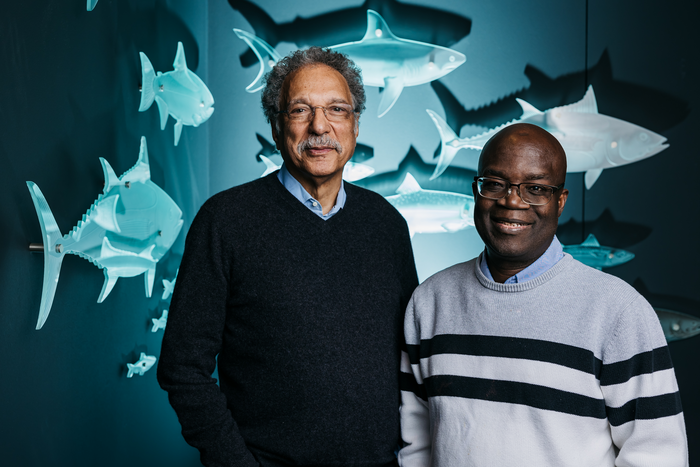Two courageous UBC ocean fisheries experts – marine biologist Dr. Daniel Pauly and fisheries economist Dr. Rashid Sumaila — have been awarded the 2023 Tyler Prize for Environmental Achievement.

Credit: Kim Bellavance
Two courageous UBC ocean fisheries experts – marine biologist Dr. Daniel Pauly and fisheries economist Dr. Rashid Sumaila — have been awarded the 2023 Tyler Prize for Environmental Achievement.
The award, administered by the University of Southern California, has often been described as the ‘Nobel Prize for the Environment.’
Both are University Killam Professors at the University of British Columbia, and long-time colleagues at its Institute for the Oceans and Fisheries. They said that winning this prize gives them an opportunity to spread an urgent and evidence-based message: all fishing on the high seas should be banned.
“If we don’t stop overfishing, we will lose marine stocks essential for food security and biodiversity, and the ocean’s ability to effectively regulate global temperatures,” added Pauly, who is the Founder and Principal Investigator of the UBC research initiative Sea Around Us.
Dr. Pauly has spent much of his four decades of research documenting the rapid decline of marine and fresh-water fish. He gained worldwide recognition for popularizing the term ‘Shifting Baselines’ – which explains how knowledge of environmental declines fades over time, leading to a misguided understanding of change on our planet. He has been the world’s most-cited fisheries scientist since 2010.
Dr. Sumaila’s research focuses on bioeconomics, marine ecosystem valuation and the analysis of global issues such as fisheries subsidies, marine protected areas, illegal fishing, climate change, marine plastic pollution, and oil spills. The question of how to “bequeath a healthy ocean to our children and grandchildren, so they too can have the option to do the same” – is what drives his life’s work. Sumaila has experience working in fisheries and natural resource projects in around the world, which has made him the world’s most cited fisheries economist, natural resource economist, and ocean policy expert.
“Creating no-take marine reserves is something we must do. Banning fishing in the high seas, which is the area outside the 200-nautical-mile zones of maritime countries, will create a critically-needed ‘fish bank’ for the world,” said Sumaila, who is the Canada Research Chair in Interdisciplinary Ocean and Fisheries Economics, and is jointly appointed at UBC’s School of Public Policy and Global Affairs.
Both have published extensively on the ecological and economic effects of the overfishing on the high seas. “A high seas fishing ban is one of the most effective ways to reverse the damage inflicted on the ocean through decades of unsustainable overfishing, mostly at the hands of wealthy Western countries,” Pauly said. “Our modeling shows that closing the high seas would result in no loss in total global catch – just a more equitable distribution. Most commercially fished species move back and forth between the high seas and coastal areas, where they can be caught in a country’s exclusive economic zone (EEZ).”
Sumaila added that support for a high seas fishing ban continues to grow – and that the closing of Antarctica’s Ross Sea in 2016, which created the world’s largest marine protected area – served as a valuable model. “More than 190 countries committed to the 30×30 agreement at the Convention of Biodiversity Conference of the Parties (COP15) in December – to protect 30 percent of their land and waters by 2030… so there are good signs of progress,” Sumaila said. “But we must move faster. Overfishing increases global emergencies such as climate change, biodiversity loss and food insecurity – particularly for already vulnerable communities, such as Indigenous Peoples and populations in the Global South.”
“Rashid and Daniel are an incredible duo — their work has had an immense impact on our understanding of ocean fisheries and marine sustainability, and generated a wealth of policy outcomes around the globe,” said Professor Meigan Aronson, Dean, UBC Science. “We couldn’t be prouder of this recognition from the Tyler Prize Executive Committee.
Chair of the Tyler Prize for Environmental Achievement, Julia Marton-Lefèvre said that she is honored to bestow this historic recognition upon scientists dedicated to protecting natural resources for future generations. “Our lives and livelihoods depend on the ocean, which covers more than 70 per cent of Earth. The Tyler Prize Executive Committee recognizes Professors Pauly’s and Sumaila’s outstanding individual and complementary achievements towards the conservation of this global life-source. By pioneering analytical approaches and knowledge platforms to assess the global state of world fisheries, they have discovered viable solutions, offering policymakers a realistic pathway towards the sustainable management of ocean fisheries,” Marton-Lefèvre said.
On April 27, 2023, the Laureates will deliver a public presentation on their work at the University of Southern California.




